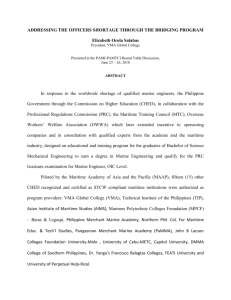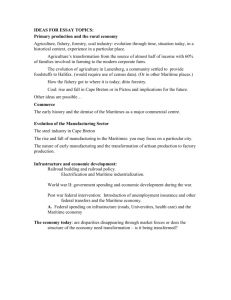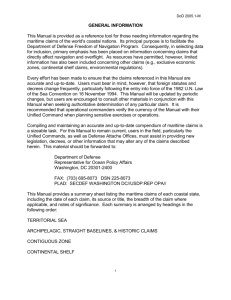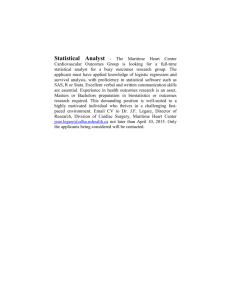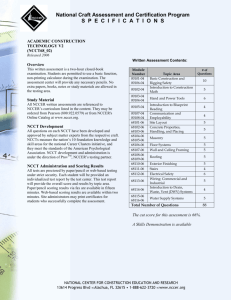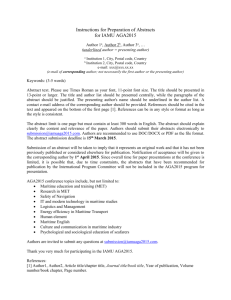August 30, 2012 - NW Center of Excellence For Marine
advertisement
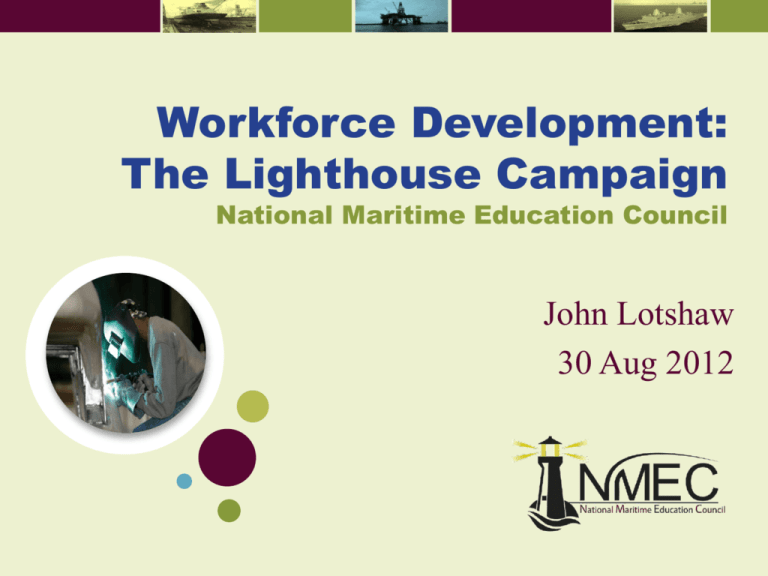
Workforce Development: The Lighthouse Campaign National Maritime Education Council John Lotshaw 30 Aug 2012 ABOUT NMEC •Mission • To lead the Maritime industry in the development, promotion, and implementation of standardized craft training processes. •Who We Are • A collaborative, multi-regional, industry-centered national organization made up of industry leaders/decision makers NMEC HISTORY • Industry-led partnership with NCCER • Established 2012 to oversee and fund the development of a national Maritime Workforce Development program • Result of regional three-year initiative • Standardized entry-level shipfitting curriculum/ training • Skills gap analyses performed through NCCER on Welding, Pipefitting, and Electrical • Call for national standardized curriculum for all production crafts NMEC MEMBERS Problem Definition •Overarching: • A lack of trained craftsmen to fill positions in maritime industries. • Issues: • Lack of standardized definitions of craft functions • Lack of curriculum and standards that support those craft • Training infrastructure to support marine industry NMEC OBJECTIVES 1. Establish an industry-wide, comprehensive, standardized, training, credentialing system for the Maritime workforce 2. Develop a pipeline of skilled craft professionals trained and credentialed through an industry-driven, uniform process 3. Improve outcomes for the maritime industry by developing better skilled, safer, more productive workforce OUR PARTNER •NCCER • Not-for-profit education foundation • Established in 1995 by the construction industry to 1. develop industry-driven, standardized craft training programs with portable credentials 2. address critical workforce shortages 3. reduce training costs/improve outcomes Mission: To build a safe, productive, and sustainable workforce of craft professionals NCCER – UTILIZED IN ALL 50 STATES • 850+ organizations • (accredited and pending) • 6,000+ schools/training center locations • Additional international programs WHY NCCER? •Established National Network •Accredited training providers •Certified instructors •Established curricula development system •Accredited assessment centers •Registry of credentialed craftsmen and women Mission: To build a safe, productive, and sustainable workforce of craft professionals WHY TRAIN? Summary of Expected Return on Investment Identified through Study CII Research Summary RT 231-1 Average Improvement Capital Project Maintenance Project Productivity Improvement 11% 10% Turnover Cost Decrease 14% 14% Absenteeism Decrease 15% 15% Injury Decrease 26% 27% Rework Decrease 23% 26% SOURCE: Construction Industry Institute. CII Research Summary 231-1. "Construction Industry Training in the United States & Canada“ (Aug-2007) NCCER LONG-TERM SAFETY IMPACT 1989-2006 - CONSTRUCTION INDUSTRY MARINE CURRICULUM – INITIAL RESULTS •Benefits / ROI—GSSC Shipfitting Curriculum • ~40 graduates to date; 100% placed • Early Results (member company) • Probationary releases down significantly • Disciplinary actions down 80% • Workweek up average of 6%; absenteeism reduced WHERE WE ARE… •Program Priorities •Core Curriculum + Intro to Maritime Supplement •Shipfitter (3 levels) • Build off GSSC Shipfitting curriculum • 2 additional levels •Marine Pipefitter (4 levels) • Orientation to Marine Pipefitting •Marine Electrician (4 levels) • Orientation to Marine Electrical Trade • Electrical Standards WHERE WE ARE… Jan Feb Mar Apr May June July Aug Sept Oct Nov Dec Core Into Mod Validation Core Into Mod Kick Off Core Assessment 2012 Shipfitting DACUM Shipfitting Level 1 Assessment Proposal, NMEC Shipfitting 2 Development Maritime Pipefitter Level 1 Development WHERE WE ARE GOING… Jan Feb Mar Apr May June July Aug Sept Oct Nov Dec Core Assessment Shipfitting 2 Validation Shipfitting 3 Validation Shipfitting 3 Kick-Off Shipfitting Journeyman Level Assessment Development Maritime Pipefitter 1 Validation Maritime Pipefitter 2 Kick-off Maritime Pipefitter 3 Validation Maritime Pipefitter 4 Kickoff 2013 WHERE WE ARE…WHERE WE ARE GOING • Core group of companies made initial investment • Identified and funding additional high priority curricula development • Maritime supplement to core curriculum • Shipfitting • Pipefitting • Broader representation from industry needed • Lighthouse Campaign You need to be with us! THE LIGHTHOUSE CAMPAIGN The Lighthouse Campaign is NMEC’s drive for expanding industry participation and funding the initiative. WHY WORK TOGETHER? “If our industry can agree on a standard set of criteria, we have the ability to sustain the right kind of training programs that feed our entry-level positions. Working together … will help us all optimize our recruiting and training investments and, in turn, help make us more competitive in an evermore challenging marketplace. No one organization can do this. We need to do this together.” Irwin F. Edenzon, President Ingalls Shipbuilding NMEC MEMBERSHIP REQUIREMENTS • Financial investment based on company size • Active participation in NMEC meetings • Fall Meeting: October 2012 • Support of curricula/assessment activities • Provide SME’s • Supply instructional resources • • • • • Photographs Videos Websites Textbooks Other INVESTMENT LEVELS • Shipbuilding, Ship Repair, Offshore Marine, and Skilled Trade Providers • Tier 1 (employing over 2,000*) • Tier 2 (employing 1,000-2,000*) • Tier 3 (employing 500-999*) • Tier 4 (employing 250-500*) • Tier 5 (employing under 250*) $60K $40K $20K $10K $5K • Affiliates (Regional/National Trade Associations, Equipment Manufacturers, Suppliers, etc.) • Platinum • Gold • Silver $20K $10K $5K *Employee count based on annual average number of full-time employees. We’ve waited long enough…invest today! QUESTIONS? John Lotshaw, NMEC Chair Ingalls Shipbuilding john.lotshaw@hii-ingalls.com Mike Torrech, NMEC Vice-Chair American Maritime Holdings MTorrech@americanmaritimeholdings.com Byron Dunn, NMEC Treasurer GSSC bdunn@atn.org Audrey Bandy, NMEC Secretary Alabama Technology Network abandy@atn.org NCCER EDUCATION IMPACT 2009 408,930 2008 344,985 2007 309,533 2006 264,960 2005 244,482 2004 184,659 2003 Strategic Plan Begins 171,810 2002 158,895 2001 133,268 2000 148,433 1999 128,633 1998 •Over 1.3 million in last 4 years 105,953 1997 •Nearly 3 million students total 90,225 1996 78,856 1995 58,914 1994 50,274 1993 39,506 1992 26,209 0 50,000 100,000 150,000 200,000 250,000 300,000 350,000 Total Students using NCCER Connect 400,000 450,000

